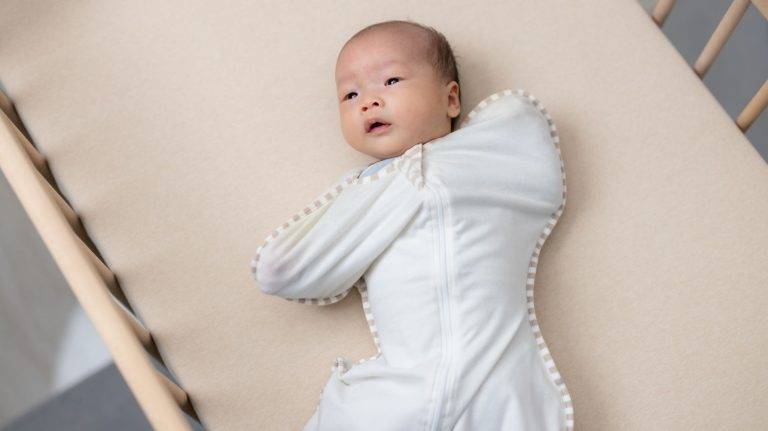
7 Tips to Get Baby to Sleep
- Created:
22. 7. 2025 - Updated:
22. 7. 2025
Becoming a parent often comes with quite a few sleepless nights, especially in those early months after welcoming a new baby. It’s perfectly normal for little ones to wake up frequently for all sorts of reasons.
However, if sleepless nights drag on for too long, it might be worth looking into. For tiny babies, it can be tricky to figure out if they’re dealing with sleep issues since they’re still getting the hang of good sleep habits.
But don’t worry! Sometimes, all it takes is a simple adjustment or removing something that’s bothering them to help your baby get back to peaceful sleep.
How much sleep do babies need (by age)?
Each baby is unique in his own way and this individuality must be respected. Some sleep all night, and others are very far from something like that. Your baby will also develop own wake and sleep schedule. Standford Children’s Health has researched baby sleep and created a tool to help you assess whether your baby’s sleep is normal.
| AGE | TOTAL HOURS OF SLEEP | NUMBER OF HOURS OF SLEEP PER NIGHT | NUMBER OF HOURS OF SLEEP PER DAY |
|---|---|---|---|
| Newborn | 16 | 8-9 | 8 |
| 1 month | 15.5 | 8-9 | 7 |
| 3 months | 15 | 9-10 | 4-5 |
| 6 months | 14 | 10 | 4 |
| 9 months | 14 | 11 | 3 |
| 1 year | 14 | 11 | 3 |
| 1.5 years | 13.5 | 11 | 2.5 |
| 2 years | 13 | 11 | 2 |
Newborns to 3-month-old babies
Soon after birth, the baby sleeps much longer than is awake. How long a baby sleeps during the day varies a lotbetween newborns. It can be 8 or even 18 hours. Sleep is absolutely essential for the growth and development of the baby. Especially in the first few weeks, the baby may have trouble falling asleep anywhere other than in your arms.
Baby from 3 to 6 months
By 4 months, an infant usually sleeps about 2 times more at night than during the day. As your baby grows, baby won’tneed to feed as often during the night and will sleep longer as a result. It is perfectly fine if your baby still wakes up regularly at night before 6 months. The baby may want to feed or be disturbed by something in his environment. A young baby usually needs a tool or toy to help him fall back asleep. In general, after 6 months, a baby’s sleeping pattern is more regular.
Baby from 6 to 12 months
Baby between 6 and 12 months usually no longer need to feed overnight. On average, they sleep 11 hours a night. They sometimes wake up hungry, and may also be restless due to uncomfortable teething.
Babby up to 12 months
After the first year, the baby usually sleeps through the night and needs to nap once or twice more during the day. After the first birthday, the total sleep time for babies ranges from 12-15 hours.
Children from 2 years old
Most 2-year-olds sleep 11-12 hours at night with one or two naps during the day.
Insomnia in babies
Sleep disorders in babies are very difficult to define and diagnose. The situation is particularly challenging in newborns, infants and toddlers, as they are still developing sleep habits. Just as among several adults, the need for sleep varies between infants and children. Therefore, some babies require more or less sleep than others from birth.
If you think your baby is not getting enough sleep, try looking for the cause of the problem. At the same time, you may be reassured to know that in the vast majority of cases, sleep problems will correct themselves over time as your baby’s sleep patterns become established.
Causes of insomnia in babies
There are many causes that cause insomnia in baby and disrupt their circadian rhythms. Uncover them so that the baby can sleep peacefully again. What are some of the most common causes?
Hunger at night
In infancy, the baby cries at night most often for feeding or contact. Especially in the first few months, they wake up very often.
Difficulty breathing
Sleep problems also occur in babies if the baby breathes too slowly. If you notice something like this or if you have any concerns, consult your doctor.
Illness
Any illness can disturb a baby’s sleep, even a common cold or cough. Therefore, focus on treating the illness.
Teething
A common cause of restlessness and crying not only at night but also during the day is teething. Soothing gums gels, such as Dologel with herbal extracts or Calgel with an anaesthetic for really sore teeth for baby from 5 months, can be used as a first aid.
Baby colic
Nervousness, crying and sleeplessness are symptoms that often accompany colicky tummy pain in a baby.
Allergies
Symptoms of various allergies disturb the baby’s sleep and make life uncomfortable. With food allergies, stomach irritation or a rash may occur. Observe whether the allergy appears in connection with the consumption of certain foods. If so, it may be necessary to introduce dietary measures.
Sleep regression
As a baby grows and develops, the length and structure of sleep changes. Parents can sometimes be taken aback by periods of sleep regression, when a baby with a regular sleep schedule suddenly stops sleeping well.
However, such periods are common and are associated with certain stages of rapid baby development. The first such period may be noticed by the mother as early as around 4 months, followed by others around 10 and 12 months, and then around a year and a half and around the 2nd birthday. Common sleep regressions are short-lived and the routine soon adjusts again.
Tips to improve sleep in babies
Insomnia in babies can be a pain for parents. Yet often little is missing to allow it to sleep undisturbed. For a good night’s sleep, make sure your baby is comfortable – in a quiet environment, with the right mattress and clothes. Here are some tips that have a beneficial effect on your baby’s sleep.
Suitable sleeping environment
Experts agree that for the first six months, the baby should sleep in the same room with his parents. This is not only for the psychological effect and the feeling of closeness, but also to prevent the occurrence of the rare Sudden Infant Death Syndrome (SIDS).
Sudden Infant Death Syndrome can be caused by heart rhythm disorders, infections or immaturity of the central nervous system. The exact cause is not known, but certain factors, such as maternal smoking or putting the infant to sleep in the tummy position, increase the risk. To avoid the consequences or, in the worst case, the death of the baby, respiratory arrest must be detected quickly. This is why baby monitors and breathing monitors exist that trigger an alarm to wake the baby or summon help.
The baby should have their own cot with a good quality mattress, as an adult bed is not safe for them. There is a risk of getting trapped between the mattress and the wall or headboard, for example. Also keep the bedroom at a suitable temperature. Too much heat or too cold can disturb a baby’s sleep. At the same time, make sure the bedroom is dark and quiet. Babies are very sensitive to noise and other distractions.
Establish a bedtime routine at home
Sleep habits are based on the activities and rituals we use to get ready for sleep. Start a simple routine around the 3rd month.
What to incorporate into such a routine?
- Bathing
- Teething (if already teething)
- Changing into pyjamas
- Putting to bed
- Reading a story or singing a lullaby
- Turning down the lights and creating a calm atmosphere
- Cuddling and cuddling, touching or kissing goodnight
Use Smart Tools Like Baby Sleep Analytics
Technology can be a great support in establishing healthy sleep habits. The Annie Baby Monitor app offers a feature called baby sleep analytics, which helps you track and analyze your baby’s sleep patterns. With insights into sleep duration, quality, and disturbances, you can better understand your baby’s needs and adjust bedtime routines accordingly. This data-driven approach can be especially helpful in identifying what helps or hinders restful sleep.
Help your baby calm down
Mental well-being goes hand in hand with quality sleep. A relaxing warm bath, massage or reading in a calm voice before bedtime can therefore be useful. Keep only a dim light on that doesn’t glare too much. A bedroom chandelier or a lamp that can be placed on a bedside table, for example, may be a suitable option. Put your baby to bed when they are sleepy but still awake. This will help him associate making his bed with falling asleep. Give him enough time to find a comfortable position and fall asleep. And if the baby is crying, talk to him.
Try lullabies and white noise
Soothing sounds can help babies fall asleep faster and stay asleep longer. The Annie Baby Monitor app includes a built-in player with over 30 lullabies and white noise tracks to calm your baby and mask background noise. You can also explore Annie Baby Monitor’s curated Spotify playlists for even more sleep-friendly sound options.
Don’t forget quality clothing
Parents often don’t realise that the main cause of their baby’s restless sleep can be sleepwear. There is no blanket way to tell what your baby will sleep best in. Everyone prefers what they are comfortable with. Even some small babies are happy sleeping swaddled, but others want more freedom in their cot.
Quality mattresses for the crib
The right mattress is essential for the healthy development of your baby’s spine and will also affect the quality of their sleep. When choosing a mattress, take into account the material, hardness and height of the mattress.
Contact a sleep clinic
Still not sure how to improve your baby’s sleep? Use the services of a sleep consultant for baby and babies. Certified professionals will advise you on your specific problem and use their experience to help you.
Final Words
Helping your baby develop healthy sleep habits takes time, patience, and often a bit of trial and error. Every baby is different, and what works for one may not work for another. The good news is that most sleep difficulties in babies are temporary and tend to resolve as their routines and development progress.
By understanding the common causes of sleep disruption and applying these simple yet effective tips to get baby to sleep, you can make bedtime smoother for both you and your little one. From creating a calming sleep environment to sticking to a soothing bedtime routine, small changes can lead to big improvements.
If sleep issues persist or you’re concerned about your baby’s rest, don’t hesitate to consult a pediatrician or sleep specialist. A well-rested baby means a happier baby—and a more rested parent, too.






